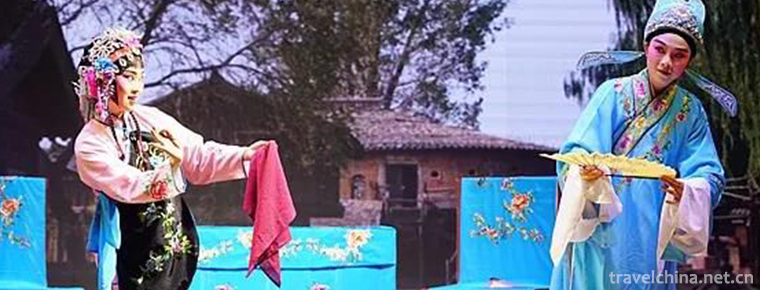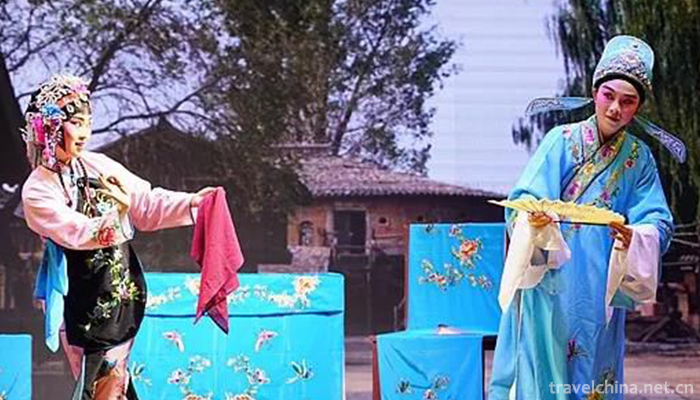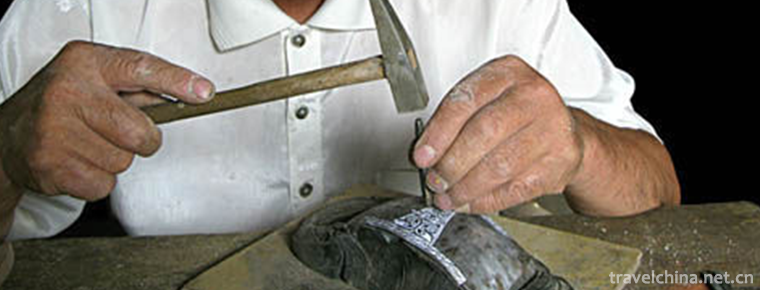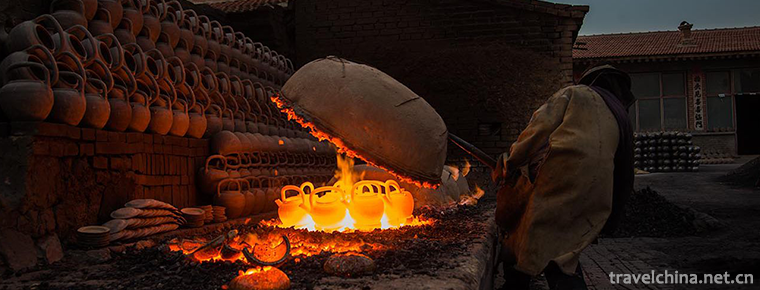2019-02-13

- By ChinaWiki.net
- Chinese Edition
- 2019-06-15
Shouning North Road Drama
Shouning North Road Drama, a local traditional drama in northern, central and Eastern Fujian Province, is one of the national intangible cultural heritage.
Shouning North Road Opera, commonly known as Fujian Random Bomb and Hengshao Opera, came into being after Random Bomb entered Fujian in the mid-Qing Dynasty, such opera troupes as road work, off-road work, North Road work and South Road work, among which North Road work is the strongest, and North Road work is still active in the northeast of Fujian, hence the name of North Road Opera. Its melody has beautiful melody, happy rhythm, smooth line, cadence, full of narrative characteristics, and strong adaptability.
On May 20, 2006, Shouning North Road Opera was approved by the State Council of the People's Republic of China to be included in the first batch of national intangible cultural heritage list, the heritage number: IV - 46.
historical origin
Yuanyuan I
Shouning North Road Opera was mainly introduced from Zhejiang to Fujian. In the Southern Song Dynasty, the Fujian people were mostly in Zhejiang, while the Zhejiang people were mostly in Fujian. Owing to the fact that most of the imperial and officialdom had their native tricks, Wenzhou Zaju, which was popular in Hangzhou, was brought into Fujian with their entry into Fujian and exchanges.
The widespread rise of local operas in Qing Dynasty benefited from the profound artistic connotation of operas accumulated in the late Ming Dynasty. It is precisely because of the non-accidental nature of local operas that the origin of northern road operas has a certain relationship with the rich soil of Zhejiang operas.
According to statistics, there were more than 200 local operas in Qing Dynasty, including Shouning North Road Opera. If the sound cavity is divided, it can be roughly divided into chord cavity, coil spring cavity, blow cavity Bangle cavity and random bullet cavity and other sound cavity systems. Shouning North Road Opera's singing tone comes from the random-play system, and like other operas, it is mostly pregnant with the folk and breeds in the countryside. There are also historical records. In the ten years of Chongzhen (1637), Feng Menglong of Ren Shouningzhi County wrote Shouning Waiting for Records, which recorded: "Xixi people practiced many operas, but they could not have the ability to lead, they went to Zhejiang Joint Class, and everyone who celebrated the good things, they performed in Fuan." It can be seen that, at that time, Shouning North Road Opera was quite prosperous among the people. Fuan is roughly in the territory of today's Fuan City, which belongs to Ningde City. It is easy to understand that Shouning North Road Opera's aria was introduced from Zhejiang Province.
Source 2
Shouning North Road Opera mainly comes from Anhui Shipai and is introduced to Fujian through Jiangxi. In the middle of Qing Dynasty, Shipai Opera and Qin Opera were introduced into Fujian Province. In the Ten Years of Chongzhen Ming Dynasty (1637), Feng Menglong, Shouning County, recorded in Shouning Waiting for Records: "In the thirty-seventh year of Wanli Ming Dynasty, Hui merchants Hongzuguo and Jiang Xingwu returned to their original places, leaving only seven boats. It can be known that Shouning County in eastern Fujian, known as "Outuo of two provinces" and "household of five boundaries", had excellent land and water conditions leading to Taishun, Zhejiang Province in the Ming Dynasty, and Anhui merchants had trafficked in salt during the Ming Wanli period (1573-1619). Another example is according to Hao Shuo's "Rejuvenation and Pursuit of Opera Troupes" written in 1780 in the forty-fifth year of Qianlong reign of the Qing Dynasty: "In addition to the Kun Opera, there are Shipai Opera, Qin Opera, Yiyang Opera, Chu Opera and other items. Jiangsu, Guangzhou, Fujian, Zhejiang, Sichuan and Yungui Opera are all popular." Shipai Opera originated in Shipai Town, Anhui Province, so the singing of Shouning North Road Opera is from Shipai, Anhui Province. There is a certain possibility of its origin.
At the end of the Qing Dynasty, the sound tune of random play was widely spread in the southern region, which inevitably had an impact on the opera music of Jiangxi and Zhejiang. Therefore, Jiangxi and Zhejiang are both on the border of Fujian, and their influence on Beilu Opera is beyond reproach.
During the period from Xianfeng to Tongzhi (1851-1874), Shouning North Road Drama absorbed part of the traditional repertoire of Siping Drama. Later, there appeared a theatre combined with Hui Ban, which mainly changed to PI Huang tune and performed more Peking Opera repertoires. For example, "Wupen Plan", "Xiaoshang Tomb", "Three Kingdoms", "Water Margin", "Sui and Tang Dynasties" and so on. Beilu Opera has entered a prosperous period. Even Pingnan, Fuan and other places have changed to playing random balls. Therefore, there are proverbs of "speaking in peace, playing in disorder with piano", and the tune is similar to that of Peking Opera. Because some of the music cards of Beilu Opera are similar to the tunes of Xipi and Erhuang Opera of Peking Opera, Beilu Opera is also called "Tubei Opera".
During the period of the Republic of China, the Northern Road Opera in Shouning Slope Beach was also noted in the inaugural issue of Fujian Opera Monthly. As mentioned above: Gutian Opera Troupe is mentioned here, but the so-called Gutian Opera Troupe mostly performs Peking Opera, but it also permeates the taste of Jiangxi Opera, such as the local theatre troupe of the Eastern Tour (now belongs to Jianou) Xietan (now belongs to Shouning) are greatly affected by it.
Inheritance and Protection
Inheritance value
As one of the rare and influential operas in Fujian, Beilu opera has profound cultural connotation and high historical value.
Current situation of inheritance
Under the shrinking environment of the whole theatre market, the Northern Road Theatre Troupe, which was restored in 1977, was no longer the same year. Since the mid-1990s, Shouning North Road Theatre Troupe began to be completely silent. Most of the actors and students have transferred their posts, went to sea for business or made a living in foreign theatre troupes. The prosperous Northern Road Theatre is on the verge of extinction.
Heritage figures
Miao Qingqi, male, Han nationality, born in 1963, Shouning, Fujian Province. The second batch of representative successors of national intangible cultural heritage projects, Shouning County, Fujian Province, declared. Declaration items: Shouning North Road Opera.
Liu Jingcang, male, Han nationality, born in 1940, Shouning, Fujian Province. The second batch of representative successors of national intangible cultural heritage projects, Shouning County, Fujian Province, declared. Declaration items: Shouning North Road Opera.
protective measures
- Personnel training
The talent training of Beilu Opera is geared to the enrollment of students in Ningde, relying on the joint training of Shouning Vocational Secondary School. In 2003, 20 students were enrolled in the first batch. Teachers of the Opera Troupe were sent to give professional lectures and counseling, and students were taught cultural courses in Vocational schools.
Government support
Shouning County has set up a special center for the inheritance and protection of Beilu Opera, set up art performance classes of Beilu Opera, and actively train reserve talents. Shouning County Theatre Troupe receives 350,000 yuan from the government every year for the training of trainees and the payment of salaries for hired teachers.
Civil attention
The villagers of Fengyang in Shouning County also spontaneously raised more than 6 million yuan, volunteered to work and sell their land free of charge, built a base for the protection and inheritance of Shouning North Road Opera, which integrates performing arts and exhibitions, and promoted the formation of Fengyang North Road Opera Troupe and the training of reserve talents.
social influence
Honorary recognition
In 2012, Shouning North Road Drama "Young Zhang Gaoqian" participated in the Fifth Fujian Art Festival and the 25th Fujian Drama Festival, winning seven major awards, including screenwriter, director and composer.
In 2016, the script of Shouning North Road Opera "Feng Menglong, Shouning Zhi County" declared the script support project of the Ministry of Culture in 2016 and won the third prize of the Thirtieth Tianhan Drama Award.
Important performances
In September 2017, Shouning North Road Opera "Qiwang Weeping General Running Visit" participated in "Jinjing Exhibition of Fujian Local Opera Classic Folk".
In 2018, Shouning North Road Opera "Zhishu in the Mountain" appeared at the 7th Fujian Art Festival.

Ask a Question
Your email address will not be published.



0 Questions